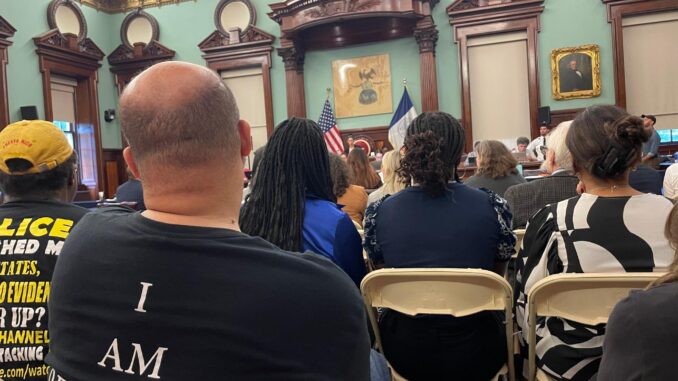
BY: AMIRA TURNER
On September 24, 2024, a large turnout of mental health advocates and community members sat through over six hours of testimony in the City Hall Council Chambers. They gathered for the New York City Council joint hearing with the committees on mental health, disabilities, and addiction as well as fire safety management, public safety, and hospitals to address the increase in demand for mental health crisis response teams in the city and a lack of expansion.
In June of 2021, New York City unveiled the Behavioral Health Emergency Assistance Response Division, or BHEARD, a pilot program created in response to community outcry for reform on the way 911 first responders have historically handled calls imental health crises. While demand for BHEARD has gone up, BHEARD hasn’t received any confirmed plans for expansion beyond its nine active teams, or budget increases in the three years since its inception.
The packed hearing began with testimony from public mental health advocates Jordyn Rosenthal, Peggy Herrera, and Alex Brass. Rosenthal, a lead organizer at Correct Crisis Intervention Today, or CCIT, began her testimony by speaking on her personal mental health experiences. Rosenthal called for “peers, not police.” She described ‘peers’ as people with “lived mental health experience”, such as herself. Rosenthal also used her testimony to honor Kawaski Trawick, Win Rosario, and Herrera’s son, Justin Baerga, all of whom were shot and killed by NYPD first responders while experiencing a mental health crisis.
During their testimony, Rosenthal, Herrera, and Brass all called for de-escalation tactics. Rosenthal and Herrera both called for a 24-hour mental health crisis team, as opposed to BHEARD’s current 16 hours of daily operation. Herrera, who is also a prominent police reform advocate, emphasized the need for mental health crisis calls, or 988 calls to be separated from 911 calls, saying, “All mental health calls should go to BHEARD. No crisis calls should go to 911, because police escalate situations.”
Testimony from a panel of representatives from the city fire and police departments, the Mayor’s Office of Community Mental Health, and NYC Health and Hospitals was given, which presented a different protocol. Executive Director of The Mayor’s Office of Community Mental Health revealed that all 988 calls are triaged, but any calls that pose “any threat of violence” will still be responded to by NYPD, even if the caller requests otherwise.
In response to questions from Councilwoman Linda Lee about the mental health training first responders go through, NYPD commanding officer Ebony Washington stated that 911 operators go through 90 days of training in total, including, “a full day training by a certified instructor, giving them all types of scenarios that they may encounter.”
Testimony also revealed that, at this time, there are no current plans to expand BHEARD beyond the nine teams present in 31 out of 77 precincts. New York Deputy Executive Director of Mental Health Laquisha Grant confirmed hopes to expand BHEARD. “The mayor and the city are still committed to a city-wide expansion of the BHEARD program,” she stated. Police Chief Jonothan Escobar claimed that the pause in expansion is being used to address concerns, stating, “Recently, as the mayor announced, we have eliminated some of the precinct boundaries.” This would allow the nine active BHEARD teams to respond to calls outside of the precinct lines they currently operate in.
During questioning, Lee pointed out that there has been an increase in the volume of calls to BHEARD since 2022, despite their reported decrease in funding, from $55 million in fiscal year 2022 to $35.1 million in fiscal year 2025. Grant responded to Lee’s concerns, claiming that the current BHEARD budget is efficient for the volume of calls received, attributing the initial budget of $55 million to startup costs.
The hearing concluded with nearly two hours of open public testimony related to the current state of mental health crisis responses in New York City. While the stories shared during the testimony varied, they were all connected by a common thread; hope that BHEARD can be expanded and improved upon for the health and safety of New Yorkers.
